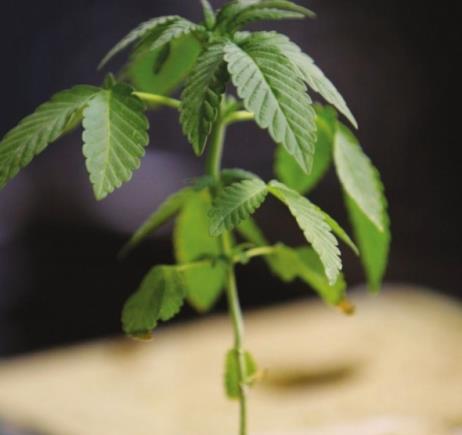
The sponsors of Colorado Proposition 64, the ballot proposal that would legalize marijuana and regulate it like alcohol, think these are three of the best arguments for voting yes:
1) Marijuana is objectively less harmful than alcohol.
2) The consequences of a marijuana offense are too severe.
3) Law enforcement resources would be better spent on more serious crimes.
The opponents of Proposition 64 evidently agree. How else can you explain why they deliberately cut them out of the State Ballot Information Booklet (aka The Blue Book), the voter guide to ballot issues that the State of Colorado sends to every registered voter in the state before every election? About 2 million will be sent out this year.
Members of the Legislative Council, the statutory committee of the state Legislature that made the cuts, said the three arguments were taken out mistakenly. That may or may not be true. But there is no question that after the “mistake” was uncovered the arguments were kept out deliberately — first by a vote in the committee not to restore them, and then by a decision by the Legislative Council’s research director, who had the authority to unilaterally restore them but chose not to do so. The truth is that the arguments for Proposition 64 were deliberately censored.
When one side in a political discussion resorts to censorship to keep you from hearing the other side’s arguments, the censored arguments usually deserve serious consideration.
So is marijuana objectively less harmful than alcohol? Here are some metrics against which to compare the two drugs:
How easy is it to get addicted?
Alcohol: Roughly one in 10 users of alcohol becomes physically addicted (turns into an alcoholic). That works out to somewhere between 10 and 15 million Americans.
Marijuana: Marijuana is not physically addictive. It does not cause cravings, users do not have to consume ever larger amounts to get high, and discontinuation of use doesn’t produce withdrawal symptoms — unlike alcohol. Marijuana is among the least addictive drugs known to man. Legal alcohol, tobacco and caffeine are all more addictive.
How easy is it to get un-addicted?
Alcohol: Kicking alcohol addiction requires major behavior changes that can take months to years to accomplish — usually with the aid of a 12-step program. Not everyone succeeds, and those who do always feel they are in danger of backsliding.
Marijuana: Marijuana is probably the single easiest recreational drug to stop using — far easier than alcohol or tobacco. Most marijuana users who want to quit using marijuana simply stop. Since no craving or withdrawal symptoms are involved, it’s generally not a big deal.
How easy is it to fatally overdose?
Alcohol: About 400 people a year die of alcohol poisoning.
Marijuana: There are no known cases of anyone dying of marijuana poisoning. To consume a fatal dose of THC, the chemical in marijuana responsible for the high, a user would have to smoke 500 pounds of it.
How likely is use to result in violent behavior and crime?
Alcohol: Alcohol use figures in about 3 million violent crimes a year, including two-thirds of the episodes of domestic violence. When it comes to violent crime, alcohol is the drug of choice.
Marijuana: Marijuana use reduces the incidence of violent behavior, a point that is obvious to anyone who has been around pot users. The assertion in 1937 by the late Harry Anslinger, the director of the Bureau of Narcotics, that marijuana “is the most violence-causing drug in the history of mankind,” and that blacks and Hispanics were particularly likely to become violent from using it, was a brazen lie, and Anslinger knew it. Anslinger’s perjury was pivotal in convincing Congress to criminalize marijuana. The truth is that marijuana is one of the least violence-causing drugs in the pharmacopeia, and there is no known difference as to how different races or ethnic groups respond to it.
How likely is use to result in cancer?
Alcohol: According to the American Cancer Society, heavy alcohol use has been linked to cancers of the mouth, throat, voice box, esophagus, breast, liver, colon and rectum, and the risk increases with consumption.
Marijuana: There have been attempts for years to link marijuana to cancer, but most of the studies attempting to do so have either failed to find a connection or have been debunked. Dr. Donald Tashkin of UCLA spent a lifetime trying to prove that marijuana causes lung cancer (because marijuana contains more cancer-causing tars than tobacco), but eventually announced that he could find no link. A number of studies in recent years have found evidence that marijuana may actually slow or prevent a number of types of cancer. (Here, we Googled it for you.)
And so on. There are a number of other similar comparisons — like the nature and extent of impairment associated with each drug, or harm to the unborn, for instance — that show marijuana to be the safer recreational drug. I’ve been following this issue for more than 20 years; I can’t recall any cases in which alcohol comes out on top.
The opponents of Proposition 64 obviously don’t want people to know that.
Which brings us to the second and third censored arguments.
Are the consequences of a marijuana offense too severe? If marijuana is less harmful than alcohol, then obviously they are. The penalties for a marijuana offense should be no worse than those for an alcohol offense. That they are not — and that each year nearly 1 million Americans are arrested and often imprisoned for doing something that is no more harmful than drinking beer — is not only unjust and unfair, it is immoral and evil.
Would law enforcement resources be better spent on more serious crimes? Self-evidently yes.
The real lesson of the voter guide’s censoring is this: The opponents of Proposition 64 don’t believe they can win if the supporters of Proposition 64 are able to make their case to the voters.
That fact alone should prompt the voters to give the supporters’ arguments a lot of weight.
Respond: [email protected]














